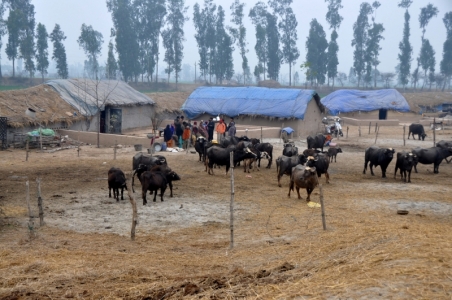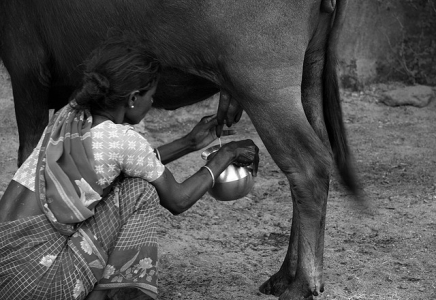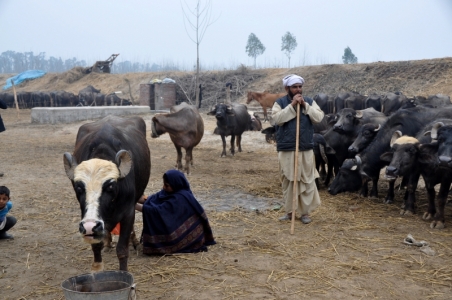Manure Knowledge Kiosk (MKK) kicks off its regional activity in 2015, participating in the Dairy Asia meeting, sensitizing policy-makers and key stakeholders in the region whilst building awareness of the benefits of integrated manure management for sustainable livestock.
 Asia has taken the lead as the world’s largest producer of milk. Source: P. Casier (CGIAR) via Flickr (CC BY-NC-SA 2.0)
Asia has taken the lead as the world’s largest producer of milk. Source: P. Casier (CGIAR) via Flickr (CC BY-NC-SA 2.0)
Manure use as an organic fertilizer is not yet a well developed practice. With the increasing growth of livestock – specifically dairy, as agricultural subsector in Asia, more manure produced is often not utilized. Despite seemingly well-known benefits of the use of manure as a biofuel source, it is less of an attractive resource as an organic fertilizer, so much so that it is seldom perceived as a resource at all in some low-income countries.
Integrated manure management is in no way news to those in research and development fields. Yet practical implementation of the practice is not attainable without proper institutional space, knowledge and enabling environments. The Manure Knowledge Kiosk (MKK) supports integrated manure management and addresses the gap in understanding and practice by increasing awareness and knowledge, and removing barriers to practice change.
At the Dairy Asia meeting, Dr. Theun Vellinga from Wageningen University Livestock Research Group presented Global Assessment of Manure Management Policies and Practices that was conducted as a scoping study in the MKK project, funded by Climate and Clean Air Coalition (CCAC), Agricultural Initiative and Global Agenda for Sustainable Livestock. He highlighted the value of integrated manure management, emphasizing its uses as a “resource for biogas and organic fertilizer” while addressing the pressing need for a reduction of Short-Lived Climate Pollutants (SLCPs). He urged the delegates at the Dairy Asia meeting to include integrated manure management into the Strategic Framework for Sustainable Dairy Development. It is crucial to highlight the benefits of manure, namely seeing it as a resource for biogas and as an organic fertilizer. Proper manure management enhances food security and assists development by making better use of nutrients in manure and reducing harmful greenhouse gas emissions.
 Source: Vinoth Chandar via Flickr (CC BY 2.0)
Source: Vinoth Chandar via Flickr (CC BY 2.0)
The Global Assessment identified findings on the use of manure in 34 countries in Africa, South America and Asia, concluding that that the primary challenges to its effective integrated use in policy and practice for agriculture and fuel are 1) a lack of awareness of manure’s potential; (2) a lack of knowledge and a supporting knowledge infrastructure; (3) ineffective policies; (4) dispersed expertise; (5) a lack of resources and investments. The resulting recommendations state the need for focusing interventions on building awareness and knowledge; developing customized solutions for simple manure storage and application equipment; and improving access to incentive mechanisms.
Importantly, based on the results of The Global Assessment of Manure Management Policies and Practices two case studies will be developed through the course of the Phase 2 of the MKK project in order to promote integrated manure management in Asia – located in Bangladesh and Vietnam. Bangladesh partners will focus on development of national policy and action plan for integrated manure management in a livestock system, and partners in Vietnam will focus on; improved manure management through increased utilization of manure including bio-slurry. The process is set to establish regional movement towards integrated manure management by approaching institutions and farmers on ground level to influence both policy and practice.
Matthew Fielding, the Asia-region manager for the MKK project stated, “There is a regional lack of awareness of the importance of integrated manure management in contributing to food security and reducing SLCPs, both on policy and practice levels. Knowledge exchange platforms such as Dairy Asia are key in disseminating information and supporting changes in the perception of manure”.
 Smallholder farmers are the key ingredients in Asia’s dairy landscape. Source: Climate Change, Agriculture and Food Security via Flickr (CC BY-NC-SA 2.0)
Smallholder farmers are the key ingredients in Asia’s dairy landscape. Source: Climate Change, Agriculture and Food Security via Flickr (CC BY-NC-SA 2.0)
Dairy Asia provides opportunities in building awareness and value of manure as a resource among key stakeholders in the region. Dairy development is an increasingly important trend in Asia due to a remarkable growth in the production and consumption of milk. According to Dairy Asia, small-scale farmers raise 80 percent of dairy animals in the region, and they have become the primary element for dairy development, poverty reduction and reductions in SLCPs in Asia.
Delegates at the Diary Asia meeting showed considerable interest in integrating the notion of manure as a potential benefit for livestock development at national levels. The delegates suggested the inclusion of integrated manure management as a resource to be made available as part of the Strategic Framework for Sustainable Dairy Development.
If approved and incorporated into institutional planning, the perception of integrated manure management as a resource for biofuels and fertilizer will further strengthen its influence among stakeholders. Bridging the gap between science and policy through informed support for useful tools and practices such as integrated manure management will enable more opportunities for sustainable growth and development.’
For more information about Manure Knowledge Kiosk project, please contact Ngamnet Aektasaeng
The author, Aziya Taalaibekkyzy is working for Stockholm Environment Institute, Asia Centre. She has interned for SEI between 2014-2015 primarily working on MKK and gender and environment related projects. Prior to this Aziya has interned with United Nations Environment Programme Regional Centre in Bangkok and worked on environmental governance and regional cooperation.
This article is based on a Regional Meeting in Anand, India, on Sustainable Dairy Development in Asia held on March 23-26 and organized by Food and Agriculture Organisation (FAO), the National Dairy Development Board of India (NDDB), the Animal Production and Health Commission for Asia and the Pacific, and the Global Agenda for Sustainable Livestock. The purpose was to discuss the adoption of the Strategic Framework for Sustainable Dairy Development, prepare a plan of action, and address the formation of the Dairy Asia platform.
Manure Knowledge Kiosk: www.manurekiosk.org